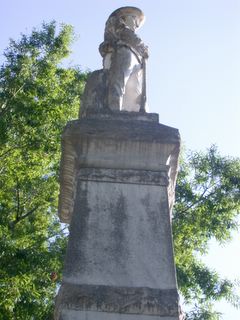In secret, the Mississippi Sovereignty Commission (1956-1977) harassed and spied on Civil Rights activists and quiet citizens as well, branding many of them racial agitators and communist infiltrators. After a 21 year long legal battle the ACLU was able to get thousands of files released. Shades of current National Security Agency domestic spying activities?
Domestic spying? It happened in Mississippi not so long ago
(December 27, 2005) --The volume of information gathered from telephone and Internet communications by the National Security Agency without court-approved warrants was much larger than the White House has acknowledged The New York Times reports. While mention of Watergate and impeachment may pervade the holiday’s political ether, it is a familiar story when compared to revelations of the Mississippi Sovereignty Commission, a retired Civil Rights-era spy agency specifically created to maintain segregation and white supremacy.
Mississippi leaders, public and private, established the commission in 1956 to spy on citizens and deal with anyone, black or white, who challenged Jim Crow segregation. Former FBI and military intelligence gatherers and paid informers hired by the commission (including school superintendents, college officials, ministers, teachers and others, black and white) were used to hassle Civil Rights workers and individuals, the records show. Files were accumulated that violated individual privacy and that could be used to destroy and even kill those who advocated for social change; the commission was authorized to “do and perform any and all acts and things deemed necessary and proper to protect the sovereignty of the state of Mississippi, and her sister states, from encroachment thereon by the Federal Government.”
The actions of the Sovereignty Commission were secret and known to only a select few in state government, including the governor who was a commission member. It was a small agency with tremendous influence on the state -- its culture and politics in the late 1950s and 1960s. Nearly every county and town throughout the state was infiltrated but most citizens had no idea of the commission’s existence. Those who worked for voting rights were spied on and taken down. Outspoken academics, doctors who treated people who were brutally beaten by the Klan or police, ministers who registered voters, sympathetic journalists and so many others were watched and reported on. Their color often did not matter. If they tried to influence social change -- to bring down Jim Crow -- they were ruined. Driven out of the state or much worse.
The worse came as the commission documented the whereabouts, finances and sexual habits of civil rights leaders. Some of the information was fed to employers and the Ku Klux Klan. Untold numbers of people were fired and others beaten and perhaps even killed after becoming targeted by the commission‘s spies and investigators.
Vernon Dahmer Sr. of Hattiesburg was probably a Sovereignty Commission victim; the commission’s files certainly reflect constant interest in the NAACP leader. In January 1966 two carloads of thugs tossed lighted Molotov cocktails into his home. Dahmer had announced earlier that day that poll taxes could be paid at his shop. Dahmer shot at the attackers while his family escaped, but Dahmer died of smoke inhalation later that day. Four men were convicted in the case while several others escaped trial. Former Klan Imperial Wizard Sam Bowers, believed to be the mastermind, was freed after two mistrials.
The same day of Dahmer’s death, two Charleston women were murdered and mutilated by Klansmen as they returned home from a Jackson meeting with Sen. Robert F. Kennedy. Both women had Sovereignty Commission files; both were early voting rights advocates. The bodies of Birdia Keglar and Adlena Hamlett were both found decapitated. Hamlett, a retired teacher in her mid seventies, had both of her arms cleanly severed from her body, relatives and her minister say. The deaths were formally reported by highway patrolmen as resulting from a car accident. It was later determined by the FBI that dozens of Mississippi patrolmen, particularly in the Mississippi Delta, were also Klansmen.
Hundreds of Sovereignty Commission records show continued spying on a white minister, Horace Germany, whose crime was to try and build a small, self-contained college for black missionary-ministers who would also be trained in agriculture. At graduation, students were to go into rural areas of the state and teach poor blacks how to feed their families. The Mississippi native was beaten nearly to death by Klansmen. Other of the Sovereignty Commission’s 132,000 pages made public shed light on the abuse of power by those in charge. For instance,
The successful trial of Byron de la Beckwith, officially the man who murdered early civil rights hero Medgar Evers, finally came about in 1994, after two mistrials three decades earlier, when released Sovereignty Commission records revealed previous jury tampering by one of the commission’s agents. Evers, a 37-year-old NAACP field secretary who pushed for an end to segregation, had stepped out of his Oldsmobile when he was shot in the back on June 12, 1963. He was walking to his house with an armful of "Jim Crow Must Go" T-shirts.
Another Sovereignty Commission report dated in March 1964 shows that one of Mississippi’s most ardent racists, W.J. Simmons, was able to get his hands on grand jury testimony about Evers that included “considerable information relative to the NAACP in Mississippi in this testimony.” Simmons, once tagged "extremist … even by Mississippi standards" by the New York Times, was considered the shadow ruler behind Governor Barnett who fought James Meredith’s entry into the University of Mississippi.
Years earlier, on September 18, 1959, commission records show that Simmons contacted the commission about an upcoming Southern Christian Ministers Conference of Mississippi that included Dr. Martin Luther King, Jr. along with other speakers from around the country. Simmons wanted "these speakers coming here from out of the state … harassed as much as possible.”
Regular people were spied on, too -- ordinary, middle-class folks who sometimes were NAACP members back then. These were not front-line activists but were people like the parents of Ralph Eubanks, a native of Mount Olive Mississippi and director of publishing at the Library of Congress. Eubanks wrote about his early life in Mississippi and the later impact of learning that his parents were spied on. In Ever is a Long Time, Eubanks told how an internet search took him to the Mississippi chapter of the American Civil Liberties Union where he discovered an Orwellian list of the 87,000- names collected by the Sovereignty Commission during its existence. Included were the names of his parents: Warren Eubanks and Lucille Eubanks.
Eubanks recalled feeling physically ill when he discovered how close his own parents came to crossing the line. Both were quiet members of the NAACP through their church; they were not civil rights activists in any way, but just quiet people who wanted to see social change. When Eubanks returned to Mississippi in the late 1990s, he found an atmosphere that was still uneasy about his mixed marriage; he and his wife were mistreated in a bed and breakfast, once the innkeeper saw them together. Eubanks left his home state believing that little had really changed in the hearts and minds of white Mississippians.
In Mississippi there remain dozens of unexamined brutalities including the 1997 murder of Cleve McDowell, a civil rights attorney who was close to both Evers and Meredith. McDowell was the first black graduate student in Mississippi; he was admitted to the James O. Eastland School of Law just as Meredith was leaving “Ole Miss.” Twice I’ve been refused access to McDowell’s records by the district attorney in Sunflower County where McDowell was murdered, even though he had been dead for over five years. The law school has also refused sharing any of McDowell’s records, including a letter of recommendation by the dean after McDowell was kicked out.
But after pulling other records surrounding the crime and speaking to McDowell’s friends and associates, it is obvious there are many unanswered questions about his more recent death: McDowell’s best friend, a Montgomery, Alabama attorney, also born in Drew, Mississippi, was murdered three years before McDowell was killed. His death was reported a suicide but after speaking to half a dozen people in both states it is apparent that McDowell saw his friend’s body and realized this was not a suicide. McDowell, reporting evidence of torture, told a minister friend that he would be murdered next.
McDowell’s files that he stored in piles of boxes in his Drew officer over the years -- records he gathered for his own investigations on the murders of Emmett Till, Medgar Evers and others active in the Civil Rights Movement -- were burned in a fire during the same week the first batch of Sovereignty Commission files were released to the public in 1998, six months after McDowell was killed. Some suggest the fire was perhaps a ruse, used to steal McDowell’s records.
Mississippi’s past is too often its present; too many questions from the past remain unanswered. Too few racist attitudes have changed in this state that continues to suffer from horrific poverty, the poorest education and all of the accompanying results. But even worse, we seem to have a much larger sovereignty commission operating throughout our entire country. I only hope that we take heed from Mississippi’s mistakes. This must be our new year's goal. The most important one of all.
* * *
Susan Klopfer is an author, journalist and blogger. The former Prentice-Hall editor is the author of two new civil rights books, “Where Rebels Roost, Mississippi Civil Rights Revisited” and “The Emmett Till Book.” She lived on the grounds of Parchman Penitentiary in the Mississippi Delta for two years while writing her books. Klopfer maintains blogs on Emmett Till, Murders Around Mississippi, and Voting Rights and is currently working on a book that focuses on Mississippi Delta cold case files. Her web page is at http://themiddleoftheinternet.com. She can be contacted by email at sklopfer@earthlink.net and by telephone at 775-340-3585.




